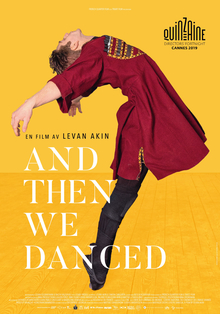
It’s always a real pleasure to watch cinema of a country to which we’ve had no prior exposure as it involves dipping into an entirely new culture and people. This one is not quite a purely Georgian film as its director Levan Akin and the production company are Swedish. Still the performers are all Georgian and it’s set entirely in the country so it counts. Of course it helps as well that this is a strong film that deserves the widespread acclaim it has received from critics.
Merab is a dancer in training who apparently comes from a family of dancers. His dance partner Mary is sort of his girlfriend and they have been dancing together since they were children. One day a new dancer Irakli joins their troupe and Merab is initially resentful of him as he is a rival who seems to be more talented even though he has been dancing for a shorter time. In particular their choreographer comments that Merab is insufficiently masculine for Georgian dance, implying that Irakli isn’t. However Merab progressively becomes more attracted to Irakli and comes to realize that he is gay. When their group of friends go to the countryside to visit Mary’s father and stay overnight, these emotions become more intense and the two eventually have sex. It is obvious that Merab has fallen completely in love and he expresses his emotions in a new form of dance that embraces his feminine side.
My wife recently commented that we never see heterosexual sex scenes in films anymore but I note that we do see homosexual ones. We’ve seen so many films about homosexual love affairs already that it’s getting stale but this one stands out due to how Georgian society remains so staunchly conservative that there is no question of being able to safely come out. Also great is the love-hate dynamic between Merab and Irakli as both are rivals competing for a highly competed spot in the troupe’s main ensemble. Merab’s passion is electric and infectious here, though it is a little odd that his realization of his own homosexuality comes so late in life. I also love Merab’s relationship with Mary who grows suspicious of what is really going on soon enough but rather than become enemy, she remains a good friend to Merab. There’s also plenty of background stuff like how dancers always find it tough to make a decent living but performing in a great show in a famous concert hall can be the highlight of their life. This is a film with rich themes and I only regret that it doesn’t show more of the country itself. Especially tantalizing are the hints that Georgian dance wasn’t always like this and the switch to a more masculine interpretation was a deliberate choice made some time ago.
There are a couple of bits that I dislike. The film uses the physical pain from dancing despite being injured as a shorthand for the character’s emotional distress. Other films have shown to great effect how such performers put their bodies through extreme trauma for the sake of their art, but must every film about dance use injury to prove the main character’s determination? I’m also not a fan of having Merab immediately go to pieces and indulge in self-destructive behavior due to being in love. Maybe he’s just a very passionate young man but it would have more intelligent to show that he’s cognizant that he lives in a very conservative country and act accordingly.
All around this is a very strong film but it’s structured a little too by the book to be truly great. It lacks any of the unique touches that makes the director feel distinctive and I note that he doesn’t seem to have yet made anything else of note. But it is very good and I do appreciate watching a film about a country I have had no prior exposure to.